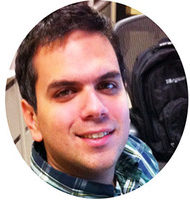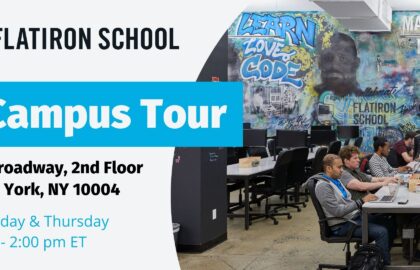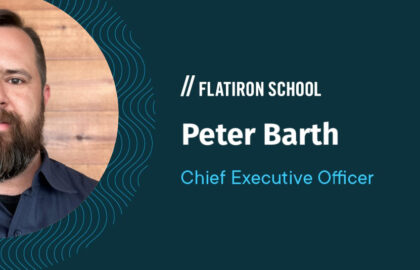
Before enrolling in Flatiron School, Basar Akyelli was an Electronic Discovery manager at Deloitte. Concerned that his skills were slowly becoming outdated and driven by an enthusiasm for Apple products, he enrolled in Flatiron School’s iOS Development Immersive. Now a Product Manager at Google, Basar spoke with us to share what spurred his career change, and how he rediscovered what he loves about tech.
Tell us a little about your background—what were you doing before applying to Flatiron School?
I got a Bachelor of Science degree specializing in Computer Science and Engineering in Turkey. Right after college, I spent a year as a software engineer for an international bank. After that, I moved to New York to work for Deloitte—where I worked for seven years before coming to Flatiron School. I started out as an Associate, but by the time I left, I was a Manager, in charge of high profile Discovery and Forensics projects.
It sounds like you already had a great, technical career. What drove you to learn iOS?
When I applied to Flatiron School, I was coding around 30 percent of the time. As a software engineer, the more managerial my role became, the less technical I needed to be. I watched my technical skills become out of date—this was the scariest part. I don’t think I would have been qualified to work as an engineer in a tech company because I wasn’t really programming for a couple years at that time. Also, Apple is everywhere, and I love their products. Why not update my skill set with iOS and learn to build apps? At the time, I thought this was going to be my future. So I applied to Flatiron School, got in, and took a sabbatical from work to attend.
What are you up to now?
I’m now a Product Manager at Google. I could have worked as a full-time iOS developer after graduating from Flatiron School, but I had gained a strong background in business and client services that I didn’t want to give up. I thought I had some valuable skills to offer from seven years of experience. Searching for a mixture of tech and business introduced me to product management. That’s how I ended up at Google. I still write code, but not full-time. I get to read a lot of code and work with a lot of fantastic engineers. I’m still new, but it feels like a good solution for me—in tech but also working with a lot of people. And even though I’m not working with iOS directly, I don’t plan to lose it as a skill—my classmates and I worked really hard for three months to gain it. Even if just on the side, I’ll continue learning.
What does it mean to be a Product a Manager at Google?
Product Managers are responsible for gathering requirements from a product’s users and translating those requirements into technical requirements for engineers. At the end of the day, Product Managers kind of own the product’s lifecycle, whether they are working with an app, a web site feature, or piece of software. They are the point people between the business team, engineers, and users.
It sounds like an inherently technical position. How does your programming background affect how you interact with the engineering team?
I think it helps immensely. After all, we’re not developing chairs—we’re developing software. I don’t know every language in which Google engineers code, but having the software background, whether from a college or from Flatiron—I don’t think it’s that different—really helps me speak with engineers in a language they like and appreciate. Now I can dive deep into technical details, which is something all product managers should be able to do. I also know what’s possible—what makes sense to implement and what doesn’t. Without technical skills, I could come up with these ridiculous requirements that would take ten times the budget and the resources we originally allotted. Instead, I can predict the resources for a certain feature.
“Flatiron showed me that technology is about innovation and passion and I’ll be forever thankful for that”
What was your experience, coming from a technical background, and attending Flatiron School?
It was great. I came for a skill, but I left with a mindset change. Flatiron School taught me a different way to look at technology that wasn’t about business. Even though I was an engineer, I was very business-oriented. Flatiron showed me that technology is about innovation and passion, and I’ll be forever thankful for that. It was like I caught a virus. I wanted to work days and nights relentlessly to make something that reached people and had an effect on their lives. I felt this way a long time ago, right after college, but I had lost it. Then I came to Flatiron School, and I saw people who had caught this passion, too—my classmates, instructors, and the rest of the community here. I was also able to network with a lot of amazing, talented people through Flatiron School who made me realize that I wanted to work in tech. It helped me look at this industry in a completely new way. I thought, “These are the people I want to work with.” Suddenly, I had ideas for apps and businesses I was inspired to pursue. This was the state of mind in which I left Flatiron School—and attending was one of the best decisions I’ve ever made. Keep in touch with Basar on Twitter or hear from even more Flatiron Alums.




